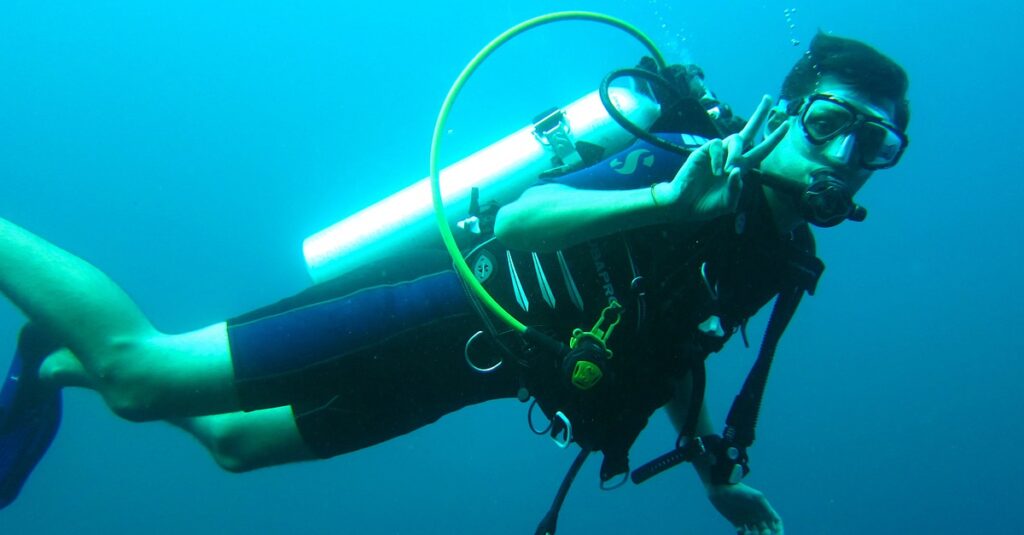

Scuba tanks are stored in the shade to prevent an increase in pressure. This wears on the sidewalls of the tanks, and, in extreme cases, may cause the tank to explode.
In this article, we look at the science between scuba tanks and shaded storage. We’ll put some myths about flammability to risk and explain how you should store your scuba tanks to keep them (and you) safe for years to come.
Charles’s Law and Scuba Tanks
Charles’s Law is an experimental gas law that explains the expansion of gas when heated, and it is the reasoning behind storing scuba tanks in shade.
While Boyle’s Law (also commonly referred to in scuba diving training) explains how constant temperature, pressure, and volume relate, Charles’s Law explains what happens to gas as temperature increases.
Heating up gas causes the molecules that it is made of to move faster, while cooling has the opposite effect. This causes the molecules to expand, and the container that they are in will expand as well.
This is why heating air in a balloon will make the balloon large, while putting the balloon in water will shrink it.
Scuba Tanks and Explosions
If you apply this to a scuba tank, which holds air in a rigid container, you have problems. The rigid container will expand, but also offers more resistance to the expansion. This keeps the gas in the tank for a longer period, heating and increasing in pressure the entire time.
A full scuba tank increases about 5 or 6 psi for every degree the temperature increases. Leaving a full tank, which sits around 3,000 psi, somewhere it can heat up means it can easily reach 3,500 psi.
The increased pressure weakens the metal, and this is how you end up with tanks exploding spontaneously.
Are Scuba Tanks Flammable?
Scuba tanks that use atmospheric air are not flammable. Air comprises 79 percent nitrogen and 21 percent oxygen, and it’s obviously sufficient for sustained breathing underwater.
Blends with higher oxygen percentages, such as Nitrox (40 percent), are at an increased risk for flammability, but they still don’t replicate the high-flammability of pure oxygen. The tanks most at risk are medical tanks containing pure oxygen.
The highest risk relating to flames or high heat and scuba diving tanks is the increased chance of explosion. Exposure to high heat easily increases the pressure in the tank while weakening the metal, and the pressure from the explosion (as well as shrapnel) can injure an individual.
How Should Scuba Tanks be Stored?
Store scuba tanks in a climate controlled environment away from potential heat sources. You want to keep them up off the ground and any surface that can hold moisture.
If you’re only storing for a short while, you can store your tank full. Long-term storage, usually anything longer than 90 days, requires pressure less than or equal to 20 bar (around 300 psi or less).
Your tank manufacturer can supply you with a recommended psi to store your tank at for longer terms. Lowering the pressure prevents metal fatigue related to prolonged expansion of the metal, but keeping a bit of pressure prevents contaminants from entering your tank.
Oxidation is also less of a problem if you store your tank mostly empty, as it occurs in direct relation to the oxygen content and partial pressure of your tank.
Can You Store Scuba Tanks Laying Down?
Do not store your scuba tanks laying down. You should take extra measures to ensure your tanks stay upright while in storage.
A tank that is laying down allows the small amount of moisture on the inside to spread against the thin metal sidewall. The bottom of the tank is thicker and better prepared to handle the moisture and any subsequent corrosion when the tank is stored in a proper upright position.
Keeping your tank upright ensures your tank will last far longer, and it protects the integrity of the tank to keep you safe during your dive.
References
https://www.britannica.com/science/Charless-law
https://www.britannica.com/science/Boyles-law
https://www.scubadoctor.com.au/care-scuba-cylinders.htm
https://aquasportsplanet.com/scuba-tank-explosions-myth-or-fact/
https://scubaboard.com/community/threads/is-a-tank-flammable.129798/
